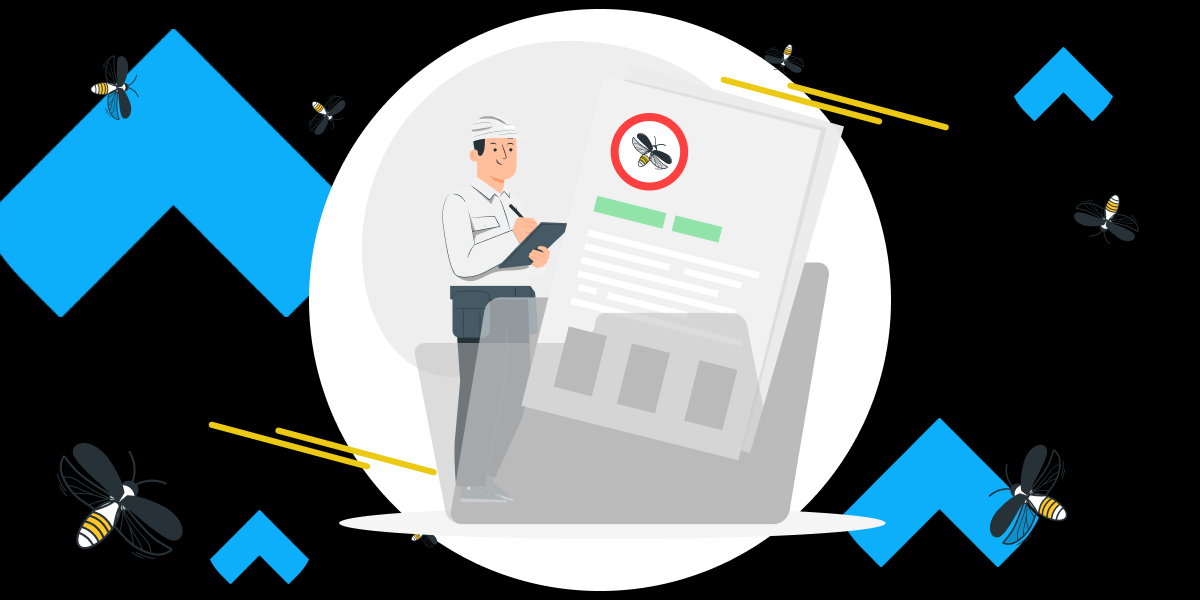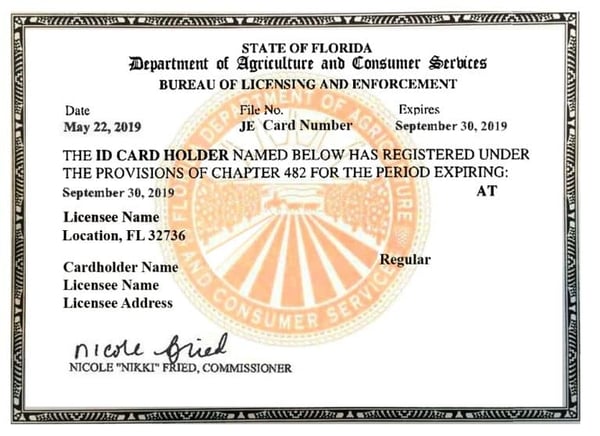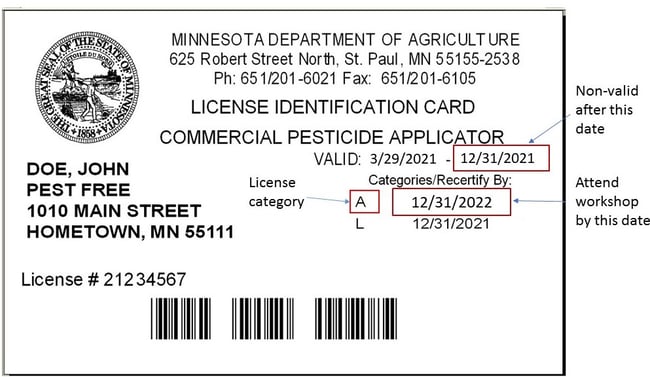What Licenses Do I Need To Start A Pest Control Business
Discover crucial licenses & permits for starting a pest control business, including the PCO License, pesticide certifications, and more.

Jump to:
Possible Consequences of Operating Without the Proper Pest Control Licenses | Essential Licenses for Starting a Pest Control Business | How To Ensure Legal Compliance for Your Pest Control Company | How To Protect Your Pest Control Business and Employees | How To Expand Your Pest Control Services and Capabilities | Launch Your Pest Control Business with Confidence
Pest control is an indispensable service that plays a vital role in safeguarding both businesses and homeowners from unwelcome intruders. These tiny invaders can pose serious health risks, cause substantial property damage, and degrade the overall quality of life within our neighborhoods.
The importance of obtaining appropriate licenses cannot be overstated; it not only safeguards your customers but also lends credibility to your enterprise as a trustworthy service provider in this highly competitive industry.
To guarantee the effectiveness and safety of pest management services for everyone involved, most states have stringent regulations in place, mandating operators to secure specific licenses or certifications before they can commence their operations.
So, which specific licenses do you need to start your pest control business? Let's take a closer look.

Possible Consequences of Operating Without the Proper Pest Control Licenses
It is essential to have the proper licenses to operate legally and ethically. If you are caught operating without a valid license, your business could face serious penalties such as hefty fines or even jail time.
Furthermore, if any of your employees get injured while performing services onsite, you might be held liable for their medical expenses should they not have the necessary insurance coverage.
The consequences can also extend beyond legal ramifications; by failing to obtain the appropriate certifications, your enterprise runs the risk of generating bad reviews from unsatisfied customers who may perceive that you lack credibility and integrity due to skirting licensing requirements.
Essential Licenses for Starting a Pest Control Business
Source: Unipest explaining how to get a license in the state of California
The first step in starting a pest control business should be to obtain the licenses and certifications required by your state. The type of license you need will depend on the services you intend to provide and where you’re located.
In California, for example, you need to get a Structural Pest Control License specific to that state, which you can learn about in the video above.
Business License
Every business needs a Business License, regardless of its services or products. This license gives you the authority to operate your business legally and per local regulations. It also allows customers to verify that your company is legitimate and reputable.
Pest Control Business Licenses are usually issued by local governments, such as county or city agencies. You may need additional licenses if you plan on providing services within multiple jurisdictions (such as counties).
To apply for this license, you may need to provide information such as your business address, name, type of business, and contact information, then pay a fee determined by the state. This process may take several days to complete.
You can learn more about licenses and permits generally through the United States Small Business Administration (SBA), and learn the process for starting your business from start to finish with their comprehensive business guide. Also, check your local county courthouse website for more information regarding business licensure.
Want some simple tools to help you jumpstart your new pest control business? Text GOSITE to (833) 779-2627 to learn more.
Pest Control Operator License
Pest control operators are licensed to control and inspect for pests in homes, businesses, and other structures. This license is usually issued by state or county agencies.
Having a license is important for any pest control business because it demonstrates a commitment to professionalism and quality. It also helps you stay up-to-date on the latest products and techniques in the industry and keeps your business on the right side of the law.
The chemicals and animals that pest control operators work with are often at least somewhat dangerous, so a license like this will help them to ensure their work is safe for them and your customers.
Since every state is different in terms of its regulations, you’ll need to research the requirements for your specific area – but the requirements typically include:
- Passing a Written Exam: You need to demonstrate that you have acquired all necessary knowledge to safely operate as a pest exterminator, which is usually assessed through a written examination. In Tennessee, you need a score of at least 70% to pass.
- Completing an Approved Training Program: Again, this is to ensure you have all the practical knowledge and training required. One such program is the National Pesticide Applicator Certification Program, but there are plenty of options across different states.
- Paying a Fee: As with all licenses, there will be an application fee. You can look over this guide to see the fees associated with each state, as well as all of the requirements.

Source: Florida Pest Control License Example, courtesy of Pests in the Home
Above you’ll see a pest control license from the state of Florida, which would be filled out with all the necessary information about your business.
You’ll notice this license expires a little over four months from the issue date. This is because most licenses need to be renewed annually or quarterly, depending on the state, to remain valid. You should be sure to look over your license after you get it to make sure you remember this date and renew your license when need be.
Pesticide Applicator Certification

Source: Minnesota Pesticide Applicator License Example, courtesy of Minnesota Department of Agriculture
Pesticide Applicators are licensed to apply pesticides as part of pest control services. This certification is usually issued by state or county agencies, and the requirements may vary from place to place.
It’s necessary for pesticide applicators to have a license for their work because of the danger of the chemicals they work with. According to the CDC, just being exposed to pesticides killed 17 people across the U.S. in 2017.
Generally, you’ll need to pass a written exam and complete an approved training program. You can learn more about these training programs through the Environmental Protection Agency (EPA).
In some states, Pest Control Operators and Pesticide Applicators must obtain separate certifications to provide their services legally. In other states, these two certifications are combined into one license. Be sure to check your local regulations for more information about what licenses you need for the application of pesticides.
How To Ensure Legal Compliance for Your Pest Control Company
The first step in ensuring legal compliance for your pest control business is to find out what the requirements are in your state. Each state has different regulations regarding licensing and certifications, so it’s important to research your local laws before starting a business.
Register Your Business Location
Before you can begin offering pest control services, you’ll need to register your business location.
Depending on your business location, this could be done through the secretary of state, a local county government office, or even an online platform like LegalZoom.
Once your business is registered with the appropriate agency in your state, you can move on to obtaining licensing and certifications. You can go to your local SBA office to learn more about what it takes to start a small business in your area.
Are you enjoying this blog?
To join our newsletter, text BLOG to (833) 779-2627.
Meet Local Permit Requirements
Depending on the type of business you’re running, you may need to meet certain local permit requirements. This could include:
- Obtaining Permits for Building or Zoning Codes: Depending on the scope of your pest control business and services, you may need to obtain a permit from your local building or zoning code, especially if you are building or renovating a building to be your company headquarters.
- Environmental Regulations: If you plan on using chemicals to treat pests, you may need to obtain an environmental permit. This ensures that your work is helpful to your customers in the short term, and good for the planet in the long term.
- Health or Safety Standards: Depending on which state you are starting your pest control business in, you may need to obtain certain health or safety standards. This could include permits for hazardous material handling, which usually pertains to pesticides and poisons.
Most states will have different rules regarding which businesses require these permits, so research your state's requirements before applying.
How To Protect Your Pest Control Business and Employees
It’s important to note that pest control businesses must adhere to certain safety regulations and protocols to protect their employees and customers. These regulations can vary from state to state, so operators need to familiarize themselves with local laws before setting up shop, but some general guidelines are listed below.
Obtain Liability Insurance Coverage
Pest control businesses should have adequate liability insurance coverage to protect themselves from potential legal issues. This type of policy covers medical expenses, property damages, and other losses incurred as a result of a pest control operation gone wrong.
For example, if you use a chemical pesticide that causes an allergic reaction in someone, your liability insurance will cover the costs of their medical bills. You should also note that many states require pest control businesses to obtain certain levels of liability insurance coverage before they can operate legally.
Apply for Workers' Compensation Insurance
Pest control businesses should also apply for workers’ compensation insurance. This type of coverage is designed to protect employees in the event of a bodily injury or illness that occurs on the job. Working with pests can easily become dangerous, so it’s vital that you ensure that your employees and your company are adequately protected.
How To Expand Your Pest Control Services and Capabilities
Every state has different requirements for the licenses and certifications needed to practice pest control, so it’s important to stay up-to-date with local regulations and make sure any technicians you hire are qualified and certified to handle specific types of pests.
For example, if a worker was bitten by a rat while on the job, workers’ compensation insurance would cover any medical expenses and lost wages they incur. It can also protect employers from being sued if an employee is injured as a result of their duties.
Hire Qualified Pest Control Technicians
The first step to expanding your pest control services is to hire qualified technicians.
Many states require that all technicians have a valid license or certification, so you should make sure the people you hire are properly certified.
Generally, the requirements for exterminator licensing vary by state and may include:
- Passing an exam
- Completing a certain number of hours of field experience with a licensed pest control company
- Completing formal training courses related to pest control topics
- Meeting specific continuing education requirements, such as attending seminars and workshops
In addition, some states may also require applicants for technician licenses to have a high school diploma or GED.
Stay Current with Pest Control Industry Regulations
The pest control industry is heavily regulated, and regulations can vary widely from state to state. To ensure that your business complies with local laws and regulations, it’s important to stay up-to-date on the latest rules and regulations about the pest control industry.
Relevant information about state licensing requirements can usually be found on your local government’s website or through a quick online search. In addition, professional organizations such as the National Pest Management Association (NPMA) offer helpful resources for staying informed about changes in the pest control industry.
Launch Your Pest Control Business with Confidence
The pest control sector may be laden with strict regulations, but acquiring the requisite licenses and certifications need not be an arduous task.
By grasping the various license classifications, employing adept technicians, and remaining well-versed in evolving industry norms, you can fearlessly embark on your entrepreneurial journey.
In doing so, you'll guarantee that your services are rendered in a secure, lawful, and efficacious manner—ultimately paving the way for success in this ever-growing market.
%20(1)%20(1).png?width=340&name=Group%2012%20(2)%20(1)%20(1).png)




